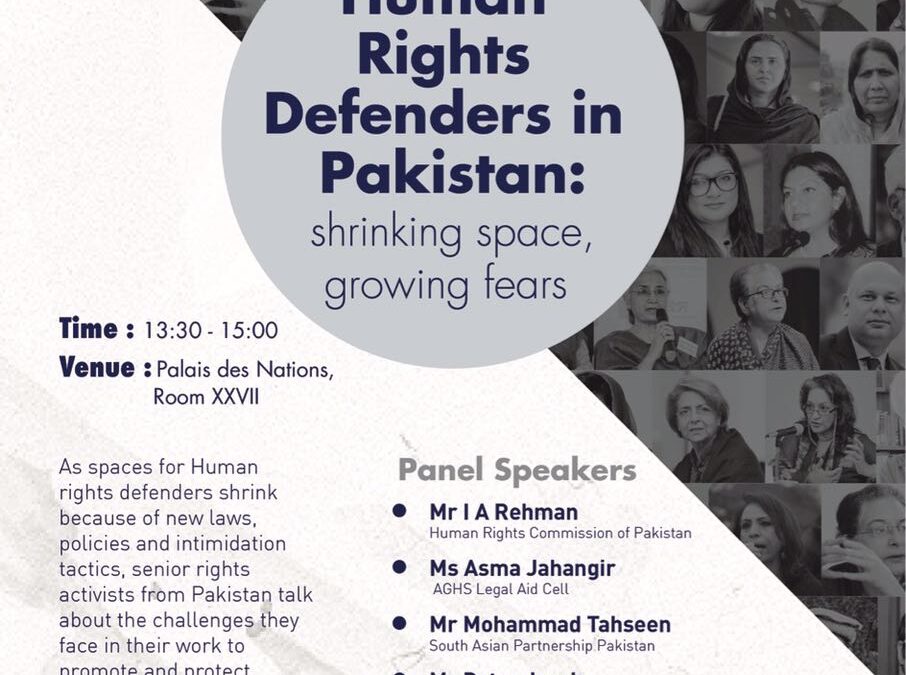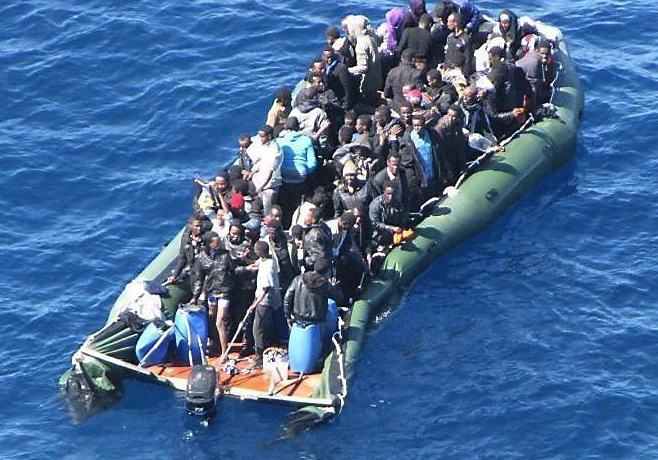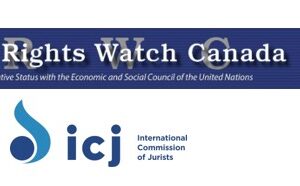
Mar 12, 2017 | Events, News
A side event to the UN Human Rights Council, Tuesday 14 March, 16.00 – 17.00, Palais des Nations room XXI.
TORTURE AND ENFORCED DISAPPEARANCE IN THAILAND
THE STATE RESPONSE
Tuesday 14 March/16.00-17.00
room XXI
Panelists:
Angkhana Neelapaijit, National Human Rights Commissioner and family victim of enforced disappearance
Yuval Ginbar, Amnesty International legal advisor
Moderated by Matt Pollard, ICJ Senior Legal advisor
The event follows the Human Rights Committee’s examination of Thailand’s second periodic report on its implementation of the International Covenant on Civil and Political Rights on 13 and 14 March 2017.
The event will focus on the measures Thailand has taken to implement its international human rights obligations with respect to the prohibition of enforced disappearance, torture and ill-treatment – with a particular focus on the draft Prevention and Suppression of Torture and Enforced Disappearance Act (Draft Law).
Background
Eighty-two cases of enforced or involuntary disappearance in Thailand were reported to the Working Group on Enforced or Involuntary Disappearances between 1980 and 2016. Civil society has also issued several reports containing allegations of torture by security forces, particularly in the restive deep South. These allegations were made against a culture of impunity which pervades Thailand.
In October 2016, after 11 years and three months of investigation, the Department of Special Investigation (‘DSI’) declared the emblematic enforced disappearance case of Somchai Neelapaijit closed, saying no culprits had been found. In January 2017, the DSI further announced it would not investigate the apparent enforced disappearance of Pholachi “Billy” Rakchongcharoen, a Karen minority human rights defender. These cases underscore the difficulties victims face in obtaining justice under the current legal framework in Thailand.
For several years, Thailand has pledged its commitment to ratifying the International Convention on Enforced Disappearance (ICCPED) and passing domestic legislation criminalizing torture and enforced disappearance. In May 2016, the Cabinet approved a Draft Law, which was subsequently transmitted to Thailand’s legislature, the National Legislative Assembly (NLA). However, last month, the NLA announced it would send the Draft Law back to the Cabinet for further consultation, effectively ending the possibility of it being enacted in the foreseeable future.
For further information on recent developments concerning this piece of legislation, please see: https://www.icj.org/thailand-prioritize-the-amendment-and-passage-of-legislation-on-torture-and-enforced-disappearances/.
A flyer for the event may be downloaded here.
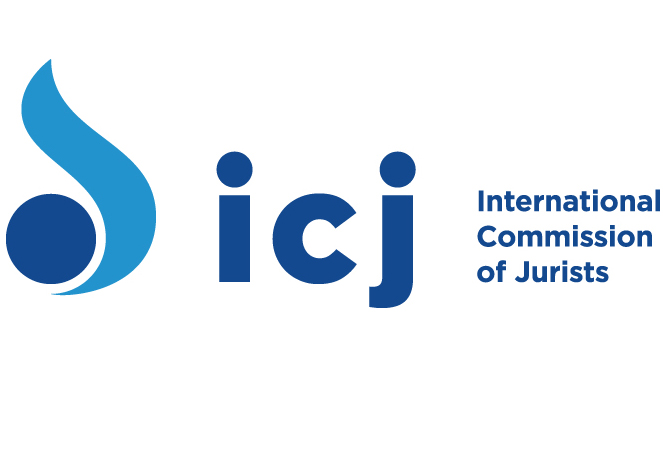
Mar 9, 2017 | E-bulletin on counter-terrorism & human rights, News
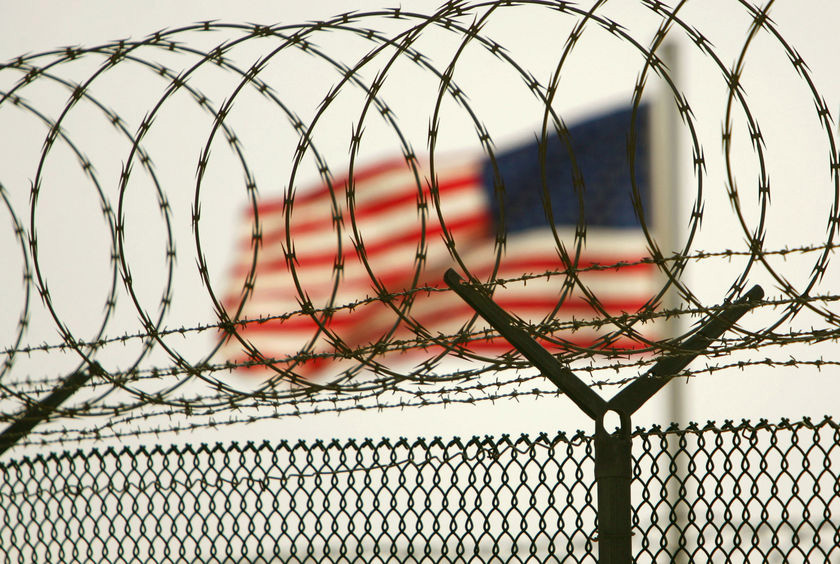 Read the 109th issue of ICJ’s monthly newsletter on proposed and actual changes in counter-terrorism laws, policies and practices and their impact on human rights at the national, regional and international levels.
Read the 109th issue of ICJ’s monthly newsletter on proposed and actual changes in counter-terrorism laws, policies and practices and their impact on human rights at the national, regional and international levels.
The E-Bulletin on Counter-Terrorism and Human Rights provides hyperlinks to full texts of reports, statements, laws, court judgments and legal analysis. It aims at fostering an informed debate on the implications of counter-terrorism measures for the promotion and protection of human rights.
AFRICA & MIDDLE EAST
Israel: High Court approves punitive sealing of home
Jordan: Execution of ten terrorism convicts
Kenya: High Court invalidates closure of refugee camps
Kenya: Crackdown on human rights groups
Tunisia: UN Special Rapporteur on counter-terrorism country visit
Tunisia: Amnesty International report documents human rights abuses
AMERICAS
USA: Rare acknowledgment of civilian deaths in Yemen operation
USA: Trump Administration focus on “Islamic extremism”
USA: Revised draft Executive Order concerning detention in Guantánamo Bay
USA: Department of Justice provides court with copy of Senate Torture Report
USA: Proposed bill would provide for revocation of citizenship and denial of passport
USA: Trump Administration will invoke State secrets privilege in case against CIA contractors who designed torture programme
Honduras: Penal code amended
ASIA – PACIFIC
Australia: Individual convicted of terrorist offences stripped of citizenship
China:Report alleges Human Rights Defenders persecution as alleged national security threats
Pakistan: ICJ urges government not to bring back military courts
EUROPE & COMMONWEALTH OF INDEPENDENT STATES
UK: Court dismisses appeal of terrorism suspects regarding revocation of passports
UK: High Court finds it lacks jurisdiction to review Privacy International case concerning Government hacking
Portugal-Italy: Extradition of CIA officer involved in CIA rendition programme
Sweden: Life sentence for Syria fighter
Turkey: Erdogan approves bill expanding Executive power
Turkey: Council of Europe Human Rights Commissioner urges Government to lift state of emergency
UNITED NATIONS & REGIONAL ORGANIZATIONS
UN: Human Rights Council dialogue with Special Rapporteur on counter-terrorism
EU: European Parliament approves counter-terrorism directive
E-BULLETIN no. 109
AFRICA & MIDDLE EAST
Israel: High Court approves punitive sealing of home
On 23 February, the High Court of Justice approved sealing the home of Jabel Mukaber, who was alleged to have carried out an attack in Jerusalem on 8 January, in which he was killed. The house serves as the residence of his widow and their four minor children who are between nine months and seven years old, and who were not involved in the attack. One High Court member, Justice Baron, in her opinion noted that the demolition of a house serving as the residence of innocent individuals was disproportionate, but approved the sealing order in this case, as privileged information indicated the family members had specific knowledge of his plan to carry out the attack.
Civil Society Report
Jordan: Execution of ten terrorism convicts
On 4 March, Jordan carried out the death penalty against 15 men in a variety of cases, including ten convicted in six terrorist attacks between 2003 and 2016. They were convicted by the State Security Court, which is composed of civilian and military judges appointed by the prime minister and adjudicates cases of terrorism, treason, espionage, drugs and counterfeit currency. Human Rights Watch said the “executions are particularly worrying because of the increasing use of the death penalty across the Middle East”.
Media Report
Media Report
HRW Statement
Kenya: High Court invalidates closure of refugee camps
On 9 February, the High Court invalidated the Government’s decision to close the Kakuma and Dadaab refugee camps pursuant to its blanket labelling of refugees of Somali origin as “terrorists” posing a threat to national security. Among other things, the Court found that the decision to close Daadab refugee camp had been undertaken without giving the stakeholders and affected parties an opportunity to make representations, thus violating the right to fair administrative action; that the decision to collectively repatriate the refugees to the border with Somalia violated the principle of non-refoulement; and that the Government decision specifically targeting Somali refugees had constituted an illegal and discriminatory act of group persecution.
Court Decision
Tunisia: UN Special Rapporteur on counter-terrorism country visit
On 9 February, at the end of his official visit to Tunisia, the UN Special Rapporteur on the promotion and protection of human rights and fundamental freedoms while countering terrorism, Ben Emerson, expressed a number of concerns including prolonged periods and conditions of detention, the use of executive orders to restrict freedom of movement and impose house arrests without proper judicial review, and allegations of torture and ill- treatment. However, the Special Rapporteur also commended “the commitment expressed by Tunisian authorities to counter terrorism and prevent violent extremism not only with security measures but also with concerted action in the social, political, economic, judicial and human rights areas”.
Special Rapporteur Preliminary Findings
UN Statement
Tunisia: Amnesty International report documents human rights abuses
On 13 February, Amnesty International published a report entitled We want an end to fear, which documents human rights abuses under Tunisia’s state of emergency. Among other things, the report reveals cases of torture and ill-treatment in order to force “confessions” at the Court of First Instance and expresses concern at functioning of a specialized tribunal established pursuant to the counter-terrorism law adopted in 2015. Furthermore, the report also looks into home raids, arbitrary arrests and restrictions on movement implemented under the state of emergency.
AI Report
AMERICAS
USA: Rare acknowledgment of civilian deaths in Yemen operation
On 1 February, Central Command admitted that civilians were killed during a raid in Yemen on 29 January, in a rare official acknowledgment. Various human rights experts have expressed concern that despite the revelation regarding civilian deaths, many questions remain unanswered. These include the legal basis for the operation, whether the government of Yemen consented to the operation, how it was prepared and what measures were taken to minimize civilian casualties.
CENTCOM Statement
Blog Post
Blog Post
USA: Trump Administration focus on “Islamic extremism”
On 2 February, Reuters news agency reported on plans by the Trump Administration to revamp and rename a government programme originally designed to counter all violent ideologies so that it would in the future focus exclusively on Islamist extremism. The programme, “Countering Violent Extremism”, would be changed to “Countering Islamic Extremism” or “Countering Radical Islamic Extremism”, and would no longer non-Islamic target groups such as white supremacists. The programme focuses on US residents and aims to deter groups or lone attackers through community partnerships, educations programmes and counter-messaging campaigns. The US National Security Adviser, Lieutenant General H.R.McMaster has reportedly advised President Trump to stop using term “radical Islamic terrorism” and has told his own staff that using such language is counterproductive. It was reported, however, that President Trump and others in the administration continue to support the use of the term.
Media Report
Media Report
Media Report
Media Report
Blog Post
Blog Post
USA: Revised draft Executive Order concerning detention in Guantánamo Bay
On 8 February, The New York Times reported on a revised draft executive order that had been circulated among National Security Council staff members, which would direct the Pentagon to bring suspected members of “Al Qaeda, the Taliban and associated forces, including individuals and networks associated with the Islamic State” to its Guantánamo Bay detention facility. The revised version of the Order deleted earlier language considering a revival of Central Intelligence Agency (CIA) “black sites”, and would no longer revive a 2007 Executive Order later rescinded by President Obama that laid out a limited understanding of which torture methods techniques count as war crimes under the Geneva Conventions. The new draft contemplates no framework for determining the disposition of potential new detainees.
Media Report
Media Report
Media Report
Media Report
Media Report
Media Report
Media Report
Media Report
Media Report
Media Report
Blog Post
USA: Department of Justice provides court with copy of Senate Torture Report
On 10 February, the Department of Justice provided the Federal District Court for the District of Columbia with a copy of the Senate Select Committee on Intelligence’s (SSCI) “Torture Report”, for preservation and safekeeping. The judges in the al Nashiri and Abu Zubaydah habeas corpus cases had ordered the Government to provide the court with a complete and unredacted copy of the report, which documents abuses in the Central Intelligence Agency (CIA) “enhanced interrogation” programme, among concerns that the new Republican Party- majority Senate and the Trump Administration would attempt to “scoop up and make disappear” the report.
Media Report
Blog Post
USA: Proposed bill would provide for revocation of citizenship and denial of passport
On 14 February, Senator Ted Cruz and Steve King, Member of the House of Representatives, reintroduced a bill that they say is a necessary step to combat “radical Islamic terror” and to ensure that “any American who forfeits their country to intentionally join” the so-called Islamic State “will have their citizenship stripped and won’t be able to use a US passport to come back and murder American citizens”. Under the proposed legislation, an individual could have his or her citizenship revoked if the person pledges allegiance to, works for or serves in the military of a group or government designated as a foreign terrorist organization. Citizenship could also be revoked upon conviction of treason against or trying to overthrow the US government or providing material support to a terrorist group. Furthermore, the proposed legislation would let the Secretary of State deny a passport to someone who joined or is threatening to join a terrorist organization or is a threat to national security. An individual would have sixty days to appeal the State Department’s decision.
Bill
Media Report
USA: Trump Administration will invoke State secrets privilege in case against CIA contractors who designed torture programme
On 14 February, attorneys for former Central Intelligence Agency (CIA) contractors Bruce Jessen and James Mitchell, the psychologists who helped design the agency’s torture programme, asked Justice Justin Quackenbush, in the case in federal court against them brought by the American Civil Liberties Union (ACLU) under the Alien Tort Statute on behalf of two men who were allegedly subjected to torture and the relatives of a third who died in CIA custody to order Gina Haspel, recently appointed as Deputy CIA Director, to provide a deposition discussing her role in overseeing the alleged torture of two terrorism suspects and the destruction of videotapes documenting their torture at a secret prison in Thailand. On 22 February, the Department of Justice indicated it will invoke the State secrets privilege, marking the first time it is used by the Trump Administration.
Media Report
Media Report
Media Report
Blog Post
Honduras: Penal code amended
On 23 February, the Inter-American Commission on Human Rights, its Special Rapporteur for Freedom of Expression Edison Lanza and the Office of the UN Commissioner for Human Rights in Honduras expressed concern over changes to the penal code concerning terrorism and apology and incitation of terrorism acts. They note the ambiguity of the offences as defined in the adopted reform, and express concern that this may facilitate a broad interpretation which can lead to sanctions over conduct that does not correspond in seriousness or nature to terrorism, including the activities of social movements and human rights defenders.
IACommHR Statement
ASIA – PACIFIC
Australia: Individual convicted of terrorist offences stripped of citizenship
On 13 February, The New York Times and The Australian, reported that earlier in 2017 Khaled Sharrouf, a dual Australian-Lebanese citizen, was stripped of his Australian citizenship by a secret panel of intelligence officials, police officers and legal experts. He is the first dual national to have his Australian citizenship revoked under the Australian Citizenship Amendment Bill, a counter-terrorism law approved in 2015. The law makes it possible to revoke citizenship if a person is a dual national and is found to have been a member of a terrorist group or engaged in terrorist activity. Khaled Sharrouf served time in prison for involvement in a failed terrorist plot and has publicly declared himself a member of the Islamic State. He travelled to Syria in 2013 and in 2014 posted a graphic picture of his son, aged seven, holding the severed head of a Syrian soldier on social media.
Media Report
China: Report alleges Human Rights Defenders persecution as alleged national security threats
On 16 February, the Network of Chinese Human Rights Defenders released its annual report in which, among other things, it highlights serious human rights violations against human rights defenders, whose activities are being criminalized as “political threats to national security”
CHRD Report
Blog Post
Pakistan: ICJ urges government not to bring back military courts
On 22 February, the ICJ called on the Pakistan Government not to bring back military courts to try civilians for terrorism-related offences. The 21st amendment to the Constitution, which had authorized military courts to try civilian terror suspects, lapsed after two years on 6 January 2017. The ICJ documented serious fair trial violations in their operation and noted that the courts had been ineffective in reducing the threat of terrorism. According to media reports, a new draft amendment would extend the “exceptional” use of military courts for another three years and would broaden the military courts’ mandate to cover all acts of terrorism, compared with the 21st amendment that covered only such acts “motivated by religion or sectarianism” and where the accused were “members of proscribed organizations”.
ICJ Statement
EUROPE & COMMONWEALTH OF INDEPENDENT STATES
UK: Court dismisses appeal of terrorism suspects regarding revocation of passports
On 2 February, the Court of Appeal dismissed the appeal by two terrorism suspects who had launched a legal bid to have their passports returned. The Secretary of State had cancelled their passports on the grounds that he suspected the appellants planned to travel to be involved in terrorism-related activity in Syria. The Court dismissed the appellants’ challenge, in which they argued that the Secretary of State’s purported exercise of powers under the royal prerogative to cancel their passports was invalid because it has been implicitly abrogated by the Terrorism Prevention and Investigation Measures Act 2011. One of the applicants argued that there had been insufficient procedural safeguards, insufficient justification and no advance consultation in relation to the cancellation of his passport.
Court Decision
UK: High Court finds it lacks jurisdiction to review Privacy International case concerning Government hacking
On 2 February, the High Court released its decision regarding jurisdiction in Privacy International’s case regarding hacking by the Government Communications Headquarters (GCHQ). Privacy International seeks judicial review of a ruling by the Investigatory Powers Tribunal (IPT) of February 2016, but the High Court found that it lacked jurisdiction to hear the substantive claims, as the Regulation of Investigatory Powers Act 2000 did not allow for a right of appeal or challenge from a decision of the IPT. Justice Leggatt expressed serious reservations whether the result is consistent with the rule of law. On 23 February, Privacy International filed a notice of appeal in the case to the Court of Appeal.
Court Decision
Blog Post
Blog Post
Portugal – Italy: Extradition of CIA officer involved in CIA rendition programme
On 20 February, Portuguese police detained former Central Intelligence Agency (CIA) operative Sabrina de Sousa with a view to extraditing her to Italy, where she had been convicted in absentia for the abduction of Egyptian cleric Moustafa Hassan Nasr, know as Abu Omar, in Milan in 2003, which was part of the rendition programme implemented by the Bush Administration. On 28 February, she was granted a partial pardon by Italian President Mattarella, reducing her sentence to three years’ imprisonment. Her original seven-year sentence had previously already been reduced to four years. Sabrina De Sousa has been held in Portugal since October 2015 and pursuant to the partial pardon’s reduction of her sentence can now choose to complete it through community service, which can be done also in Portugal.
Media Report
Media Report
Media Report
Blog Post
Blog Post
Blog Post
Sweden: Life sentence for Syria fighter
On 16 February, the Stockholm District Court sentenced a former member of Firqat Suleiman el-Muqatila to life in prison for his participation in the unlawful killing of seven captured Syrian soldiers in Idlib in 2012. Haisam Omar Sakhan had subsequently travelled to Sweden and applied for asylum. He was arrested last March and charged with having committed war crimes. His defence argued that the captured prisoners had been executed pursuant to a conviction of rape and murder following a fair trial by a court established by a non-State actor during an armed conflict. The Swedish court concluded a non-State actor may be able to establish a legitimate court under some circumstances, but in this case found that the soldiers, who showed signs of torture in the video of their execution, had been killed a mere two days after their capture and could not have received a fair trial under the circumstances.
Court Press Release
Media Report
Blog Post
Turkey: Erdogan approves bill expanding Executive power
On 10 February, President Recip Tayyip Erdogan approved a Bill that would significantly amend the Constitution, strengthening the powers of the Executive. A popular referendum on the amendments is scheduled for 16 April. Among other things, the amendments would enable the president to issue decrees and declare emergency rule. If approved by the referendum, presidential elections would follow in November 2019. The changes would also allow a president to serve up to two five-year terms. Erdogan’s current mandate would not count towards those term limits.
Blog Post
Media Report
Turkey: Council of Europe Human Rights Commissioner urges Government to lift state of emergency
On 15 February, Council of Europe Commissioner for Human Rights, Nils Muiznieks, urged Turkey to “display the tolerance expected in a democratic society”, noting a first step “is to lift the current state of emergency and reverse the numerous unacceptable infringements of freedom of expression … that it engendered. In addition, the Turkish authorities must completely overhaul the Criminal Code and the Anti-Terrorism Law so as to align law and practice with the jurisprudence of the European Court of Human Rights.”
Commissioner for Human Rights Memorandum
Blog Post
UNITED NATIONS & REGIONAL ORGANIZATIONS
UN: Human Rights Council dialogue with Special Rapporteur on counter-terrorism
On 3 March, the Human Rights Council held a clustered interactive dialogue with the Special Rapporteur on the promotion and protection of human rights and fundamental freedoms while countering terrorism, Ben Emmerson, and the Special Rapporteur in the field of cultural rights of everyone and respect for cultural diversity, Karima Bennoune. Special Rapporteur Emmerson, in his latest report to the Council, addressed several principal issues in his mandate including accountability of public officials, mass digital surveillance and the use of drones in extraterritorial lethal counter-terrorism operations. He makes recommendations for structural change to the UN counter-terrorism architecture, which he describes as “piecemeal institutional arrangements”, while noting that the goal of mainstreaming human rights protection throughout UN counter-terrorism initiatives would remain elusive with the current proliferation of often under-resourced entities with overlapping responsibilities without a coordinating body.
SR Report
OHCHR Press Release
EU: European Parliament approves counter-terrorism directive
On 16 February, the European Parliament officially approved the new EU directive on combatting terrorism that was informally agreed by Parliament and Council in November 2016. Member States now have 18 months to incorporate the measures into domestic law. The ICJ and other civil society organizations have expressed concern that the overly broad language of the directive could lead, among other things, to criminalizing public protest and other peaceful acts, the suppression of the exercise of freedom of expression and other unjustified limitations on human rights. The legislative process for adopting the directive was alleged to have lacked transparency and opportunity for critical debate.
EP Press Release
ICJ Statement
Find this E-Bulletin and more information about the ICJ, the rule of law and human rights on our website: www.icj.org. Please send feedback about the E-Bulletin to icjcounter-terrorism@icj.org.

Mar 9, 2017 | News
Amnesty International and the ICJ regret the decision of Thailand’s National Legislative Assembly (NLA) to further delay the passage of essential legislation criminalizing torture and enforced disappearances.
Our organizations call on the Thai government to cease its stalling measures and instead prioritize the amendment of the Draft Prevention and Suppression of Torture and Enforced Disappearance Act (Draft Act) in order to bring it into line with international law. The government should then ensure its passage into law without undue delay.
On 28 February, the Office of the High Commissioner for Human Rights announced that it had been informed that the NLA would not enact the Draft Act. The following day, an NLA official speaking to BBC Thai confirmed that the draft would be “returned [to the Thai Cabinet] for more consultations… with Interior officials, police authorities, the national security sector, military authorities and prosecutors.”
The Draft Act is the result of years of effort by government authorities, including by Ministry of Justice officials who consulted with our organizations and took account of many of our recommendations in elaborating it. The draft was approved by Thailand’s Cabinet in May 2016.
The recent decision by the NLA has indefinitely delayed the enactment of this important piece of legislation, which would represent a significant step towards preventing torture and enforced disappearances in Thailand.
The slow-tracking of this law in the face of all the commitments Thailand has made over the years right up to last year is extremely disappointing, especially for the victims of torture and enforced disappearances who have struggled to obtain justice in the absence of a clear legal framework.
The most recent version of the Draft Act addresses many existing gaps in Thailand’s current legal framework and could support Thailand’s compliance with its obligations under international human rights law. However, further amendments are needed to address significant shortcomings in the Draft Act.
In particular, the Draft Act omits key elements from the definitions of torture and enforced disappearances, does not criminalize acts of cruel, inhuman or degrading treatment, and fails to define enforced disappearance as a continuing crime. Additionally, the Draft Act does not extend criminal liability beyond the direct commission of the act and fails to unequivocally bar the use as evidence in court proceedings of statements obtained by torture.
Thailand should make it a top priority to address these and other concerns and to enact the law as soon as possible. The urgent need to amend and enact the Draft Act is underscored by recent reports alleging the use of torture and other ill-treatment by state security forces and the continued failure to hold accountable perpetrators of torture, other ill-treatment and enforced disappearances.
Our organizations remain committed to providing any necessary assistance to the Thai government in amending the Draft Act or otherwise acting to prevent torture and enforced disappearances in Thailand.
Background
Thailand is a state party to the International Covenant on Civil and Political Rights (ICCPR), the Convention against Torture and other Cruel, Inhuman or Degrading Treatment or Punishment (CAT), and has signed, but not ratified, the International Convention for the Protection of All Persons from Enforced Disappearance (ICPPED).
The expert UN bodies overseeing the implementation of these treaties have consistently called upon states parties to criminalise torture and enforced disappearance as specific crimes.
On 13 and 14 March 2017, the UN Human Rights Committee will review Thailand’s compliance with the ICCPR.
In Thailand’s 15 November 2016 reply to the Committee’s List of Issues,[1] it noted that it was in the process of passing the Draft Law which would “provide clear definition and set up specific offence on torture to be in line with the terms set forth under CAT” and “serve as an implementing legislation for ICPPED.”
It also noted that the Draft Act “aims to strengthen the prevention, suppression, and prosecution mechanism and to ensure remedy for victims as well as address the problem of misuse, and abuses of power by government authorities with regard to torture and enforced disappearances.”
It concluded by noting that “[o]n 24 May 2016, the Cabinet approved the draft Act in principle. The draft has been reviewed by the Council of State and is currently waiting to be submitted to the legislative branch for consideration.”
[1] Human Rights Committee, “Replies of Thailand to the List of Issues,” U.N. Doc. CCPR/C/THA/Q/2/Add.1, para 51.
Thailand-Joint Statement-Torture Legislation-News-2017-ENG (Press release in PDF)
Contact
Kingsley Abbott, Senior International Legal Adviser for Southeast Asia, Tel: +66 94 470 1345, E-mail: Kingsley.abbott(a)icj.org


